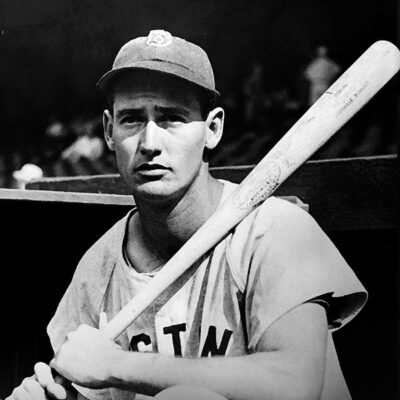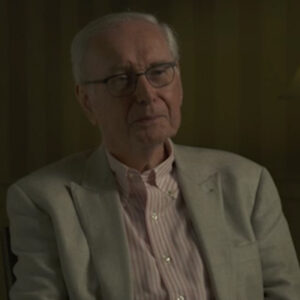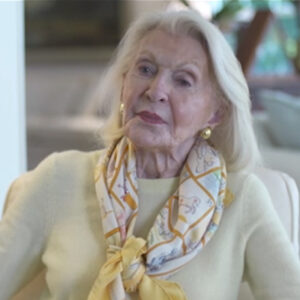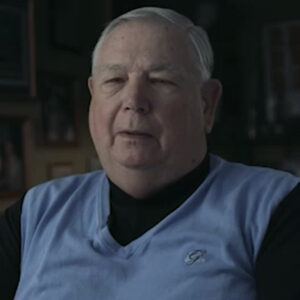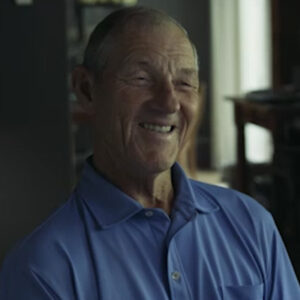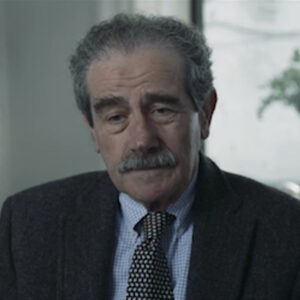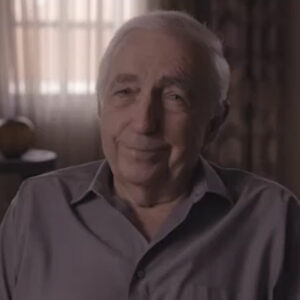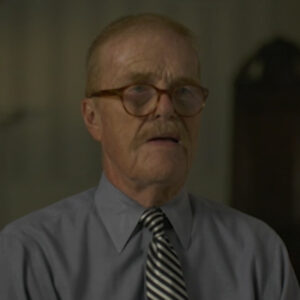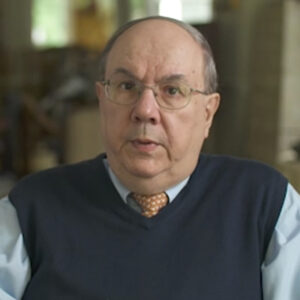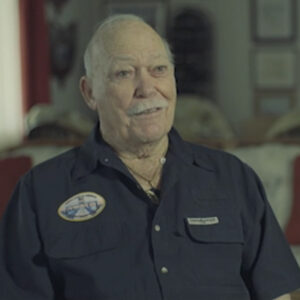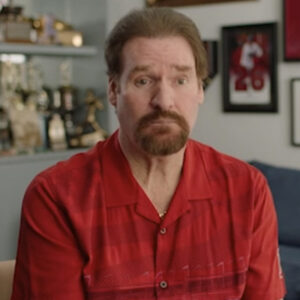Speaker 1 Well, there’s no question he was the greatest hitter in my lifetime, and you could argue the greatest left handed hitter of all time, you could argue that even had he not been a great baseball player, he was a military hero. You could argue that Ted Williams was more than generous to people less fortunate than himself, especially to children. And another element about Ted Williams said has not received enough publicity is the fact that he was a great friend of players of color, one of the first superstars, maybe the first white superstar to champion the African-American baseball athlete. You know, there are all the obvious, are there you know, he’s a man and a ballplayer to be champion. I found him fascinating and I had an incredible career in that. I was, as a young boy, wanted to be Ted Williams. And I’ve written a book with that title and then got to meet him after shadowing him in Michigan. I’d hitchhike in from our Michigan farm as a teenager whenever Boston came to town just to be near Ted Williams and actually followed him to the ballpark. One day to watch Ted Williams take batting practice was to watch a great concert pianist rehearse. He never hit a sour note, and he is accused of hitting some sour notes with his profanity. And that was all real, but was part of his not being perfect. And I think that his upbringing in San Diego by a mother who often wasn’t at home, she was more concerned about her role in the Salvation Army, made him independent, somewhat insecure, but driven. Here was a man driven to be the best at heading, as he said, around ball with around bat squarely. And he accomplished that. But he was obsessed to be the best hitter that ever walked down to the ballpark and achieved that goal.
Speaker 2 Yeah, I mean, everything I’ve read, I I’ve seen he definitely was that guy. Yeah, definitely. We. Especially like the idea of like you think about these people who are attached to, let’s say, you know, who just have this gift of him being able to, like, not only hit the ball, but like, of course, see the ball. And it is incredible, like way of seeing the ball as it came to him with, you know, being able to see the stitches. As I was reading, you know, that he just had this incredible mind, incredible eyesight, and it really knocked the ball in the park.
Speaker 1 And doing some of the research on that, let’s say you have 20, 20 vision. I mean, any ball player would like to be 20. We call that perfect vision. That’s gives you every advantage to see the ball out of the pitcher’s hand. But Ted was measured, some say twenty, twelve. That’s probably impossible, but twenty ten to twenty. I’m going to start that again. We talk about somebody with 20/20 vision. That’s perfect vision. Hey, a ball player. If you want to hit a curve ball slider fastball one hundred miles an hour, you better have 20/20 vision. But Ted was measured. Some say even a twenty ten. That probably is not possible. But it’s OK to stretch the truth. But let’s take twenty twelve. The simple mathematics rubber to home plate is sixty feet six inches. So let’s leave the six inches aside sixty feet to make it easier mathematically so Ted could see a ball out of the pitcher’s hand where someone with 20/20 vision do the mathematics. Didn’t see it until it was at thirty six feet. And that’s a huge advantage. And it certainly paid off when he was chasing some an enemy jet pilot and he saw the enemy in mid-air before the the enemy saw him.
Speaker 2 I mean, that’s I think it’s great. Yeah, I mean, he really gets to the military, but just again, like that skill set, I mean, that’s incredible to think about it. Even with fishing, like he because of his strength and his ability to make that possible vision, you know, the the benefits of that in terms of everything that he did, especially flying. I mean, that’s what a specimen he was.
Speaker 1 Well, it’s he was the complete athlete. I mean, he had the physical coordination. He had the strength. He had the vision. Some could argue that he wasn’t the best of defensive players, but he was initially as a rookie. And then he ran into too many hard walls and bruised, bruised elbows and broken shoulders and that sort of thing that took away some of his defensive strength. And he didn’t always take it too seriously either. But people should know that in high school, Ted Williams was an outstanding pitcher. He held the San Diego section strikeout record for seven innings, said 17 strikeouts for a long, long time, but hurt his arm. And some felt that he wasn’t good throwing the ball. But he was at one time. I find little opportunity to find fault with him. Yeah, might have been not the best father and maybe he wasn’t the best husband. And he was right up there, top of the league and profanity of those three put those aside. But Ted Williams was my hero and we all love our superheroes. We had that man. We’ve had Superman Wonder Woman all my life time and I’m over 80 years old. We still go see them and pay a good price to watch good against evil. That’s what Ted was. Hey, he had some Pintera an escape, OK? But he was my super hero. And I’m not about to scrape the veneer of this man and find something wrong with him. There was so much that was right to applaud.
Speaker 2 Well, I think you’re right. And I also think that some of the things that were. You know, the. The negative stories or the negative parts of him, which everybody has, he’s a human being, but like I think you could root to to a reason, you know what I mean? It’s not necessarily malicious or or foul, you know.
Speaker 1 So, yeah, let’s talk about let’s talk
Speaker 2 about a little bit about, like the the problems with the press and the spitting. And, you know, you don’t mind telling us that. And that’s a big part of our story. And like his, you know, everything because we’re talking about his whole life and the ups and downs.
Speaker 1 Well, Ted, get got to the big leagues. I’ve got 19 years of age. He was very immature and for good reason in the background has been documented. Here’s this immensely talented player that is just a kid. He was called the kid. Right. And the Boston Press baseball press may be the most difficult in all of the major leagues at that time. They found themselves good bait and they did exactly that, Ted. They he was easy to upset. He had rabbit ears. He didn’t like any criticism, didn’t handle it well. And so he would react to a writer that took him apart. And and then he, with a reaction, gave that writer an opportunity to write another column. He was bait for the next column. And the Boston writers kindly were venomous at the time and didn’t want him. Would they finally decided they weren’t going to be positive about him and they were going to find something negative about him every day. And that, of course, carries over the press, influences the fans and now the fans and left fielder to go out to play his position. And they would yell and taunt him. And Ted, as they said, there could be ten thousand fans cheering him. But if one guy’s yelling at him, he hears that one overall, the crowd. And so he did use his middle finger and he did spit, whether at the the crowd or at the press box, at the writers. He admitted later that wasn’t the right thing to do. But he was a kid and that’s how he reacted and wasn’t ready to handle all the publicity that goes with a player that has so much talent at such a young age. I mean, no one no one Coach Ted Williams, how to behave. He didn’t have much father and mother support at home. He kind of learned his own way. And baseball was his his God, his parent and his way to see success in life and. Well, I think I can answer that.
Speaker 2 Did you agree and it just it’s so interesting, you know, I’m just thinking like nothing nothing says that when you become this athlete, you know, this has notoriety. You know, that you have to have a relationship with the press. You know, it’s not like other jobs. We you can go and come. We can come and go without anyone knowing what you’re doing, because this is you know, there’s a big lens here, but still, you don’t have to love and says that he has to have any kind of relationship with the press or has to be kowtow to them or be appreciative. There’s nothing says that he has to do that. And maybe he was that just wasn’t who he was. He wasn’t that person who was the warm, fuzzy guy that could have that. I mean, like he didn’t really have to
Speaker 1 know what Ted was distrustful and suspicious and maybe even paranoid at times as a young guy. But there’s no one that’s in the public eye. And I include myself there in a modest way that picks up the newspaper and read something negative about him that says, oh, I don’t care about that. It hurts. You don’t like to have some things said about you, sometimes not even true that are not complimentary. And you react to that. And I did. And I know I’ve never met anyone who does. And some of us can better and not say anything. Ted Williams could not. And he attacked back and that just gave the writers more fodder. Let’s write another negative column on the Thumper.
Speaker 2 And let’s go back, how did how did you guys meet?
Speaker 1 Well, I first met Ted Williams at a distance of about 20 yards as a kid. I’m outside the book Cadillac Hotel in downtown Detroit. Boston’s in town to play the Tigers. Williams love to walk. And he would walk with another player in this instance with Steve O’Neal, who was his manager to Briggs Stadium. It’s about a one mile distance downtown Detroit hotel to Briggs Stadium. Then came Tiger Stadium. And one day there I am. And here he comes. There’s Ted Williams. There is my hero. And as he left the hotel, I shadowed them all the way down Michigan Avenue. If he stopped, I stopped off. He picked up the pace. I picked up the pace, never daring to ask for an autograph or a handshake. And when he walked into the players gate to bring stadium, I mean, I was in another planet. I was so excited. So that’s how we first met. First time we met, eyeball to eyeball, I was the rookie announcer. Nineteen sixty nine of the California Angels. Ted Williams was the new manager of the Washington Senators. They came to the West Coast, alas. So he had gone through all the writers all the way through the American League, asking him how was he going to handle players in his pitchers because he hated pitchers and finally came to Anaheim Stadium. And I insisted that that night I’m doing the pregame ten minute interview and I’m going to interview Ted Williams and say, oh, he’s not going to be too friendly. I had to find a reason. So I go to the baseball register and in his book, the autobiography, My Turn at Bat, and there it is in nineteen forty before the Red Sox, a blowout game, they didn’t want to use a regular pitcher. Ted was a high school pitcher. They put him in the game when it was fifteen to two or something and he pitched two innings. So I said, that’s it. So I go down the steps that I got. There’s Williams. No one in the press daring to bother him. Big electrical field around Teddy Ballgame. And I said, Mr. Williams, I’m Dick Thornburgh. I know it doesn’t matter that you were my idol. I try to be like you and hit left handed. I’m the new announcer. The Angels didn’t even look at me. And I have the pregame interview and I’d be honored if you would give me a bit of your time to do the pregame interview. Still wouldn’t look at me looking out at his players. And I promise you, Mr. Williams, I won’t ask you one question about hitting. I got a little kick out of him and I said, I want to ask you about nineteen forty. When you pitched against the Detroit Tigers, he looked over me. He says, come here, meet me as a complimentary term for those most of us in baseball, I think it’s a derivation of meathead, which he was called by his manager back in his rookie year.
Speaker 2 Wow.
Speaker 1 And I can finish the story and you can use whatever you want to use and so and so through the years, whenever I was calling a game back in Boston and he might be in town for the Jimmy Fund, he would recognize me out of a crowd. Didn’t always remember Dick, but it worked fine with me. And then to my good fortune played in my life, I moved from L.A. to San Diego. And Ted, being a native of San Diego, would come back and through a mutual friend, Bob Breitbart, who established the San Diego Hall of Champions, he would ask if I would like to have breakfast with Ted and and that would become a routine. When he came to town, we’d get together or he’d call and say, no, you want to talk some baseball now? How beautiful is that from a kid shadowing his idol in Detroit when I was 14 to the end of my life and his as well that my idol recognized me even said Eigenberg, you’re the best announcer in baseball. Probably told everyone that, but I’m accepting that is the full compliment.
Speaker 2 Wow. And. Did you ever get a chance to you talked a little about this like. We talked a little bit in terms of the how about upclose, did you ever did you ever witness anything in terms of his temper or, you know, anything with.
Speaker 1 You know, there as a as a manager, as a guest on my Sports Challenge show back in the 1970s, meeting him in more casual terms for a lunch or breakfast or dinner, I think, Ted, you know, people should know Ted mellowed beautifully as he aged. You know, there are others and I’ll even name one, because he was so often compared as a player with him, Joe DiMaggio, the elegance center fielder of the New York Yankees. And as Joe got older, he seemed to get crankier and crankier and didn’t want to be bothered by anyone. It was not personal, Ted, who had the reputation of being a nasty boy and the guy throwing the finger in the spit as he got older, he got sweeter and sweeter. That’s a tough word to use on Ted Williams. But he did he when when I was with him, we’d walk into a restaurant. He didn’t just brush aside the the maitre d or the guy at the door. He would stop saying, how are you doing, fella? What do you do? He was very curious guy. I mean, he was a very bright with only a high school education. He really was a smart guy. And he wanted to know a lot about things. He knew a lot about politics. And one thing a lot of people don’t know, he probably helped us select one of the presidents of the United States. It’s a long story, but he had a hand in George Bush, the first Bush becoming president of the United States. I don’t know if I want to give that away, it’s in my book.
Speaker 2 Well, I guess since you brought it up, I’m going to go on. She brought up Joe DiMaggio to talk about a little bit and go back and forth a little bit here, since you brought him up, like can you compare, like, you know, in batting style and attitude and personality, Ted, with his with his long time rival, Joe.
Speaker 1 And, you know, I think in their playing days, Joe was the was elegant. He was everything he did was graceful. And yet he was a powerful player. He was a complete player, maybe. I mean, if you’re going to argue DiMaggio was the more complete Major League player, now Ted Williams was the best hitter. It’s interesting that in their hey, it’s interesting. In their heyday, they were talk about trading the two because Ted Williams with Right Field in Yankee Stadium, the short porch down the line would hit even more home runs. And DiMaggio with a monster at Fenway Park would hit more home runs there. Ted said, no, no, no, that wouldn’t work. I had most of mine to right center in a world, what, 417 out to that Death Valley at Yankee Stadium and DiMaggio hit line drive home runs. And the wall would have taken a lot of those home runs and turned them into singles and doubles. He said that would have been a terrible trade.
Speaker 2 And let’s talk about what was your favorite nickname for Ted Thumper or Teddy Ballgame, The Splendid Splinter, The Kid.
Speaker 1 Well, you know, as a kid following him and wanting to be him, splendid Splinter had not only a nice alliteration, but an image that I could wrap my arms around. He like Teddy Ballgame. Teddy Ballgame was his favorite. So that’s what he like best to be loyal to my idol. I think Teddy Ballgame will be my answer.
Speaker 2 OK, and. Well, how do you feel to to to be in the ballpark? With Ted, you know, like every time you saw him, every time you had an experience with him, you know, I know there was this you know, he was one of the greatest hitters and, you know, but what was it like to tip to trysting that feeling?
Speaker 1 Ted, was magical. I mean, he he conquered a room and a baseball stadium. I mean, when he walked into whatever that facility might be, you knew Ted Williams was there. Part of that was this big voice. He had a sonic boom voice. And when he came, you could hear him come on before he hit the door. And he always had a question. Hey, Dornberg, what’s up? I know what the toughest game is to call on. I could hear not even in the restaurant yet. And now he’s yelling at them. But that was his voice. It was big sets down. He said, yeah, what what’s the toughest game to call? And I said, Ted, it’s your game. Baseball is the most challenging game. And if you can call baseball and red, you can call any other sport. Oh, we said I thought you would ask when I ask you that. I thought you’d say basketball. That’s the only time I got Ted Williams because he usually knew the answer. When he asked the question, he was he was trying to see if you knew the answer. And he did that in politics. He did it in baseball and anything else that might be on his mind.
Speaker 2 I want to grab something real quick instead of my bag.
Speaker 1 My answers are probably way too long, but that’s what the adding machines are for. Perfect.
Speaker 2 She took my comments as well. So much recovery
Speaker 1 tonight, and we need just a little phrases. Oh, this is great to get from one place to another, I’m sure, for you. Could tie it in with today a little bit as influence continues today. Let’s talk
Speaker 2 about. Absolutely.
Speaker 1 You know, in today’s world where there’s so much talk about baseball, having too many home runs and you can go back and the last generation, Wade Boggs and George Brett and Charlie Liow influence in the line drive hitter and Ted Williams always. So you have to hit the underside of the ball to drive it and hit home runs. And it’s interesting today you look at the young players and they’re adopting the Ted Williams theory of hitting Chris Bryant’s dad teaches Chris Bryant that as a batting instructor. And in Las Vegas, he teaches the Ted Williams technique. You look at some of the young rookie start Bellinger, that’s Ted Williams swing. So his influence continues. I mean, he he was not only an artist, he was a scientist. He was both he was an artist in that he knew how to paint the whole picture. He knew exactly how it all worked. And he was a scientist in that he experimented enough till he found the right answer. When they first came out with a slider that bothered, he couldn’t hit the slider as well as the fastball and the breaking ball. And so what did he do? He calls up Boston University. Boston College. You got any pitchers that can throw a slider? Yeah, I got a kid sent him over. I’m going to take extra batting practice tomorrow morning. I want to take 30 minutes. I want to hit that slider. He he wanted to be perfect. He was. He was the baseball park was Ted Williams laboratory. And the scientist was going to find the true answer, the real answer to success. Yeah, kids that are way, way, way, way in the back, just a little crowd noise. That’s our seven week old. She came all the way from one to to have the baby here and had the baby had scripts almost in the same room where she was born and in same place my grandmother started. Yeah. This and we got a three year old and then a friend’s three year old. And it’s been mayhem up there driving me to the Tanqueray bottle. Oh, you have more than one room. Yeah, that’s right. Um. I can tell you it well,
Speaker 2 yeah, anything it please,
Speaker 1 you can try to think of this. OK, let’s wait till the baby knows she’s walking home from. The trouble breastfeeding and there’s no one else can help. And it’s got to wait for the when the milk machine is the first and they can’t sleep because the dairy two and a half hours, he wants to eat again. And so they’re she’s really tired. And then you got a three year old running around and that’s why you’re supposed to have babies when you’re young. You know that at our age now we couldn’t handle it. And we think they ought to give you all my good stuff out of my book. Yeah, please. Yeah, no. Ba ba ba ba ba ba ba
Speaker 2 anything from, like, conversations you guys had during your breakfasts together? Could be political. It could be baseball.
Speaker 1 Yeah, yeah, his. Well, let me talk let me talk about the Jimi. You know, we were going to talk about the Jimmy Fund. We didn’t do that. I. I recently talked to the folks that are operating the Jimmy Fund in Boston, which, you know, Ted really was, you could call him one of the founders of the Jimmy Fund. It was his hips, his face and his effort and his giving so much generous time to kids with cancer that has made the Jimmy Fund live on. And Ted still lives on with it and recently talked with him and ask, how much money do you raise each year, the Jimmy Fund. And the answer is startling 80 million dollars a year raised for charity. Jimmy Fund and Ted Williams name is Right under Jimmy Fund. There’s this beautiful story, and it was chronicled in either Ben Bradley’s book or Lee module’s book and confirmed I had to confirm Ted on one visit he hit Ted insisted no, no writers, no photographers. He didn’t want any publicity. That was kind of the side of Ted. He did have that soft side and he did care about people, but he didn’t want those mean writers up in the press box at Fenway to write something nice about him, that he was with this sick child, very sick child and 19 years old and goes in to visit him. And the boy grabs Ted’s finger and won’t let go. And Ted motions for the nurse to move a cot over next to the boy he lays down with a boy. The boy falls asleep. And Ted, where the boy still holding his finger, sleeps at his side or rests at his side. How great is that?
Speaker 2 Wow, that’s wonderful. Yeah, and since you brought up the Jimmy Fund, like there was when you talked about, you know, is it true that he told the press, if you write, you know, that I’m coming here visiting kids, that you would stop doing it?
Speaker 1 Yeah, well, I yeah, I think that probably ties in with that. I can tell you that. I mean, I’m certain he did say that.
Speaker 2 Yeah. So if you don’t mind, like, you know, that’s part of my.
Speaker 1 No, he made it clear to everyone, and especially the press, that if you write about it or take a picture of me in the hospital, then I’m just not going to do it anymore. And he got the press then. I mean, obviously, he was doing great work, raising charity and helping kids. And he was always there for the call. You know, the word is the more in researching my book is that when somebody had a charity to help young people or sick people or kids and even though he was in Florida meant coming up to the northeast Boston or Father Ted never said no, he showed up and didn’t want any. If he was at a charity event, I’d never ask for any money to come. He did that for the kids.
Unidentified Right. That’s great.
Speaker 1 You want me, maybe you’ll use this, but I wish you’d use it. For me, having the privilege of knowing Ted Williams, knowing my idol, and for him to recognize me and then to write a book about him and do the research for the book, but has pleased me so much, is the more I did research on Ted Williams, the more I admired him. I love him all the more now than I did when I was an 11 year old kid.
Speaker 2 And it’s really thing in your in your expertise, you know, there’s so many things that are out there and people know about Ted and the stats and the fishing, but is there is there anything? That you could tell us maybe that
Speaker 1 we don’t know? Well, the stat that no one celebrates, you know, you can take the five years and you can extrapolate how all of them would have been seven home runs or 700 home runs would have been whatever how many hits, how many RBIs. But the one statistic that everyone ignores that I think is the most important statistic. I think the most important statistic is. How many times you don’t make it out, you’re on base percentage reflects how many times you don’t make an out. There’s no one close. Babe Ruth is a distant second. Ted Williams and his entire Major League career, when you count hits and walks, was on base more than any other player in baseball history to me. How good is that? I mean, is he not the greatest?
Speaker 2 And that’s a whole cause.
Speaker 1 Yeah, not making out and of course, he was criticized by the press because he walked too much. Well, you know, his rule was you get a good pitch to hit. You want me to hit the pitcher’s pitch and hit 220, or do I get to hit a pitch? That’s a strike. And the writers didn’t like that. The fans wanted them to swing the bat more. Well, Ted had the scientist had a system, and that’s the way he was going to play. There was a nice little story in there somewhere that was going to say, oh, you probably heard somebody say the tell the story. So I’ll tell it again. It hit. His vision and not only picking up the ball early, but his knowledge of the strike zone and knowing what a good pitch was to hit the home plate is waiting. God, I can’t even talk here. Home plate is 18 inches wide. The baseball is two and a half inches in diameter. So you get anything touching the corner is a strike, right? So you put two and a half into and out. That’s five inches, 18, 23 inches is a strike for the pitcher. Ted knew that as well as any one ever. And once he was at bat and a rookie catcher was behind him in the first pitch was close ball one umpire second pitch ball to the catcher. That that. Yeah. Oh. Seven weeks.
Speaker 2 Oh, my.
Speaker 1 He’s just a little pup. I think that’s what’s happening. She’s walking. I’ll try to shorten this up to you. It’s OK. I think a story, however true, and I think it is that that really reflects what a great guy he had and how well he knew the strike zone was, he’s up at the plate, a rookie catcher behind him, first pitch close outside ball one. Next pitch, look pretty good ball, too, says the umpire. Captured Lookback, Second Pitch, Jastrow, ball three. And finally, the catcher turns to the umpire and says all three of those were strikes in the umpire, said kid Ted Williams will tell you when their strikes.
Speaker 2 Oh, that’s great. Wow. How about the last the last game of the forty one nineteen forty one season, you know, that incredible day that hasn’t been as
Speaker 1 think forty one or sixty, you’re talking about 60 the last his last game before they won
Speaker 2 the last game of forty, nineteen, forty one season. And that’s wrong. That’s when he hit on. He chose to play rather than sit out.
Speaker 1 Oh, OK. Got it. Yeah, yeah, yeah, yeah. All right. Affecting his numbers. Yeah, yeah. No one’s told you that story in. So Ted Williams is sitting three ninety nine nine five something of the around it off it’s 400 and there’s two games to play, not one, two games to play in Philadelphia. So a double header on a Sunday, I presume, the last day of the season. And I can’t recall who his manager was, but might have been Pinki Higgins goes to him and says, hey, you don’t have to play Ted on Sunday and you can use Ted for hundreds. No one’s done that in 11 years since Bill, Terry and Williams said, look to hell, I’m not going to play and put me in there and put me in there both games. Well, Ted Williams says, let’s go six, four, eight and rounds it off at four old six. He was not about that was the man in him. That was the man who called twice into the military and answered the call. That was the man who stood up for the black athlete. That was the man who cared about kids. You know, I’m not going to sit on the sidelines and let it happen accidentally.
Speaker 2 Right, so he didn’t care as much about numbers, you know, before we did.
Speaker 1 Oh, no, no. He cared about the numbers. He cared about hitting 400, that’s what. But he was going to earn it. He wasn’t going to let some statistician round off a number to make it four hundred. He wanted to earn that title. And who knew at the time? He told me, he said, gosh, if I don’t know how important that was at that time. You know, Bill Terry, I’d remembered he’d hit four hundred, eleven years ago. I didn’t know anyone would ever do it again. And you know who came closest to doing it again? Ted Williams at age thirty eight. Thirty nine. I might be off a year. I think it was thirty nine. He told me if he’d had he couldn’t run a lick, if he had had seven more. You can do the math. If he’d had seven more hits that year, he’d hit a 400 at age thirty nine. He’s the that’s the best batting average of anyone since he hit 400 in a single season, including Rod Carew and George Brett and and Tony Gwynn, who flirted with 400. Wow. I so wish I should know that exactly, but I mean, he’s an old man and he almost hit 400 again.
Speaker 2 Pretty incredible.
Speaker 1 We don’t
Speaker 2 have any. Let’s talk about a little bit and we might skip a little bit between service and playing and. Let’s talk about anything you can tell us about Ted is a fighter pilot, World War Two Korean.
Speaker 1 Well, Ted didn’t Ted did not see combat in World War Two, he was a flight instructor and he had without ever really knowing how to fly, learned how to fly and was one of the best then in the Korean War. He saw active duty. I think he had thirty nine combat missions, a jet pilot. Then there was a propeller in World War Two. John Glenn called him his best wingman ever. He flew with Glenn. He shouldn’t have been alive. He had he was shot up on a mission and North Korea and crippled airplane flew it back, couldn’t get it back to the base, but got it to another military base. Crash landed, fuel tank empty crash landed nine thousand foot skid and able to crawl out of that cockpit alive. He said later he thought about ejecting. But Ted was six three and cramped into that cockpit and he felt that if he had ejected, he probably would have broken both legs and would have ended his career. What a decision to make it midair on an airplane that’s about to crash and able to survive. So he meant harm’s way and took the head on just like a good fastball.
Speaker 2 And, you know, again, remains maybe a little repetitive like this made me think like what made him good at everything that he did, like fishing and piloting baseball, like he was he tackled everything. And he was a success at everything that he tried.
Speaker 1 DrippiN driven to be perfect. And there are a lot of people like that. I must admit, I have a little of that in my gut as well that I want to be. I still haven’t done, after 60 years the perfect broadcast. There’s always something I know I could have done better. And when you’re ad libbing for a half hour, for three hours, there’s no air racers on the microphone. So it goes out there and it’s not perfect. And Ted, despite not being I mean, Ted wanted to hit 500. I’ll tell you the story. When he was a kid here in San Diego and his house is still up on Eutaw Street here in town, it was a rainy day and he and his brother had a little game in the garage with a broom handle and a black walnut. He said, you know how hard a black walnut is and burn. Yes, sir, I do. He said, well, Mike, we would take turns hitting the black walnut. And of course, that had to help his keen eyesight. And my brother hit a line drive back to me and hit me right in the right eye. He said, you know, I never did see quite as well out of that right eye since I said, Ted, that’s your front. I if that I had been better, you would have hit five hundred. Yeah, I might have.
Speaker 2 That’s great. How about anything about the talk of the 1946 World Series?
Speaker 1 OK, so when I am four years old, my grandpa was a big baseball fan, had a grocery store. If I could answer a little simple baseball trivia, I’d get a Superman bubblegum out of the grocery store. And my dad loved baseball. My mother did tease me on a baseball bat, so it’s in my DNA. So when we had the usual family get togethers and the aunts and uncles. Well, Dickie, what do you want to be when you grow up? I’m going to be a baseball player. And that’s it for at 11, it’s nineteen forty six. The war is over. I’m sitting in front of a big radio that we’d gotten up to San Francisco. Gas rationing was over. And I’m listening to the forty six All-Star Game. And Ted Williams is coming up. And Rip Soulas is on the mound for the National League and so has that famous APHIS pitch fans that blooper ball and no one’s ever hit a home run off it. Here’s Williams. He’s already homered two singles in the game. He fouls that one off and here comes another one. And bam, there it goes. And Williams has hit that blooper pitch for a home run. And when that ball went out and I heard that description, I said, Dickey is not only going to be a baseball player, he’s going to be Ted Williams.
Speaker 2 Great.
Speaker 1 Tank is empty.
Speaker 2 You know, you OK for a few more? Yeah, OK.
Speaker 1 OK, so how long did it take? About three words out of all this. So it’s a half hour or so, right? Is it an hour show?
Speaker 2 You know, I honestly don’t know the length of this particular. It’s American masters, but it’s it’s I think it’s a documentary film. So it’s not like the normal episode.
Speaker 1 Oh, OK. Yeah. Yeah. Proper tribute to the proper guy.
Speaker 2 Yeah, absolutely.
Speaker 1 When you think about it, there’s been no you know, this. So is this rolling so I can wander off? Know, I talked to Vin Scully about this and we talked about our youth and we learned baseball and had our idols on his was Mellat and mine was Ted Williams to lefthanded hitter hitting outfielders. And the advantage we had that carried over as broadcasters was that we were able to use our imagination, you know, television. The punch line is already taken. There it is. I mean, that’s what it is. But what on radio, when you listen to a baseball game, your idols, the game itself was bigger than life and what an advantage that was for us. And I think it carried over into trying to paint the picture, the proper picture. The canvas is already painted on TV, but on radio you have the brushes and the paint and you create the entire picture so that the fans might enjoy the game all the more. And on radio as a kid helped us to do that.
Speaker 2 Yeah, I made two older brothers or played all throughout junior high and high school and my oldest brother was going to go play. He went a different direction, he bowed out at the last minute, but he was going to play with the Glendale College and then he was going to go, I forget where he was going to go.
Speaker 1 They that they had good teams. I coached the San Fernando Valley State. We used to play there, the junior colleges.
Speaker 2 And so but but so but they used to as a kid, I listened to them. I used to watch them listen to baseball games on the radio. And we went, I love baseball, but not like that. I mean, they could really like to say,
Speaker 1 oh, you go to bed, hide in the radios or your mom and dad didn’t hear you. So you can hear the end of the game.
Speaker 2 Yeah, they really got into it. So let’s talk a little bit more. What do you think made Ted an American hero?
Speaker 1 Well, that’s the easy one. He was the greatest hitter ever argue the greatest tenor ever. Are you the greatest pianist ever? Are you the greatest speaker ever? Are you the whatever the greatest. So Ted’s the greatest hitter. Then he gives up five years of his career to serve his country and is a military hero that anyone who does something extraordinarily well and better than anyone else is someone to not only admire, perhaps copy, to add adore. And I think we need heroes. I go back to Superman and Batman and Wonder Woman. It’s amazing. You know, they’ve been around all my life and yet people spend lots of money to go see him again. I mean, it’s still an attraction. People want heroes. People want someone that’s better than they are or better than they could even conceive that they could be. I guess that’s what heroes and friend of mine in college. I once did a little piece on heroes, not necessarily Ted Williams. And I said it was at the Olympic Games and I was doing a hero piece. And I said, what would how would you define a hero? And he said, give me some time to think about it. So he calls me back and he says, a hero is someone I would like to be. Pretty good, pretty good, simple answer, Ted Williams was somebody I would like to be. He was my hero.
Speaker 2 And he himself was a hero
Speaker 1 and to it, yeah, I mean, it’s there was no discouragement and I didn’t have to read the Boston Press. I’ll tell you a quick story on that. Ray Flynn, the former mayor of Boston, South Boston, he grew up at 10 years of age, was selling the Boston American newspaper for three cents at Fenway Park, and he did 75 papers to sell at every game. Love Ted Williams. Kids love Ted Williams. I wasn’t the only one. Kids love Ted Williams. And he would win. The papers would arrive. He would go through to the sports page and see if the writer had written anything about Ted and if he wrote something negative, he would go through all 75 papers and rip out that page. He later became mayor of Boston, Ray Flynn.
Speaker 2 What? Let’s talk a little bit about, like the fishing.
Speaker 1 I don’t know much about his fishing. I really don’t. You know, I I’m not a fisherman and I know he was he was a champion. He’s in the Hall of Fame of Fishing Hall of Fame. And that’s about all I know
Speaker 2 anything about the the 1956 World Series.
Speaker 1 The 1946 World Series haunted him. I think that is he looked back over his great career, that was the one pothole, the hiccup that he wished he could go back and undo. I mean, he never was a winner of a World Series and the weight was on his shoulders. And he only had, I think, four hits in that series. He had injured himself the week before. A lot of people don’t know that Boston had clinched the pennant. Forty six way in advance of the World Series. So they’re going to have this long delay of just playing games just to play the games. And and so there was a delay and they arranged to have an exhibition game with a college team or an all star team around Boston. And the pitcher hit Williams on the elbow and it swelled up. So he went into the wood. No one knew about it and went into the World Series with a sore elbow. And it probably did impact his swing and impact his performance, plus the fact they threw the shift at him and they threw everything else. They didn’t give him a lot of good pitches to hit. And even at that, the series was won because of an injury to Joe DiMaggio’s brother, Dominic DiMaggio, who was a great center fielder and in the eighth inning against the Cardinals, doubled off the wall, barely missed. Being a home run was a double that tied the game. Had it been a home run, it would have been possibly the winning run. But Dominic DiMaggio and rounding first pulls a hamstring and limps into second. They have to take him out of the game and put in an outfielder. Probably very few know his name, Leon Culbertson, left handed thrower. So when he slaughters on first base and the line drive goes to left center field, Dominic DiMaggio got a chance, got it and thrown in. And probably Slotter wouldn’t even have made it to third. But with Culbertson going over to get it and he was slower, so he faded back on the ball to field it. Now he had to spin and throw and it’s all in front of Slotter. And Slaughter told me at one of our sports talent shows, I saw him getting late to the ball. I’m brown in second. He’s still not there. I’m going I decide I’m going to go for it. He never would have tried it against DiMaggio, but he wasn’t in the game. He races all the way home. Slaughter’s the hero. Cardinals win in seven. Ted Williams doesn’t deliver a low moment for Ted Williams. That’s great, top down, by the way, Dominic DiMaggio, Joe DiMaggio’s brother, love Ted and many ways late in life, some would say Ted was Tom’s brother, that they he called when Ted was failing. And about Ted, you know, Don would call literally every day to see how Ted was doing. He loved he loved Williams. OK.
Speaker 2 Do you know anything about him, you know, when he took. He took a pay cut, you know, after winning the batting title, anything,
Speaker 1 no, it wasn’t a batting title. He had a bad year. He had one down year again in 59, 59, OK, he was 59. He turned 41. That that was here, he had hid under 300, I know that. So in 1959, Agent Ted Williams as father time getting him the reaper, gets them all so he has a bad year. He hits under 300, just uncommon. I mean, it couldn’t Ted Williams can’t hit under 300, so he decides to play one more year, doesn’t want to end on that season. And goes to Tom Yorkey, the owner of the Red Sox. And Yankees have the same contract one more year, one hundred twenty five thousand dollars. And Williams said probably stronger than this. Like hell, I’m not a hundred thousand dollar ballplayer. Do you see what I hit last year? Give me ninety five thousand. Ted Williams took a thirty thousand dollar cut just out of there is the man again doing the right thing. And then he comes back and he hits almost three is last year and of course finishes it off with that glorious home run in his last at bat. Oh, my.
Speaker 2 That’s great. That’s great.
Speaker 1 Oh, that’s. I’ll tell you that story. It’s got a nice story about Ted Williams in his last game, Curt Gowdy, a good friend, the announcer for the Red Sox goes down the clubhouse before the game and the clubhouse guy says, hey, Ted’s not going to ever was New York or Washington. For the end of that, there’s a three game series on the road left. He said he’s not going to finish the season on the road. Who already now knows something no one else knows. And so Goudey, when he makes the call of Ted Williams hitting the home run, is able to say not. Ted Williams has homered in his final game at Fenway Park. Doughty’s called as Ted Williams in his last major league at bat has hit a home run. And even the press said, wait a minute, he’s got three games in New York. And that was the one time that broadcasters scooped the writers because he was on top of it. What a nugget for Doughty to have as as Williams delivered the home run, I talked to Jack Fisher, who threw the pitch. He was with Baltimore. And I said, checked out enough times gone by. You threw him a piece of candy that you really laid one in there for me. No, I didn’t. He said I had a chance to win that game. I came in and relief in the first inning for Steve Barber. It was my game. Now we’re in the eighth inning. I got a chance to pick up big league win. I’m a rookie pitcher, so my best pitch is a fastball. And Ted Williams to that point was one for eleven against me. And he hadn’t gotten a hit off me in that game. He did a couple of balls to right field, but it was dark and dank and heavier and the ball didn’t carry. And so now the counts one on one, he’d fouled one off, one on one catch. It wants me to throw a curveball. I’m going to throw all my best pitch. I shake him off and throw him a fastball and he drills it for the home run. I didn’t give him anything that I know. I had everything behind that pitch in a nice back story to it, Jack said he got back to Baltimore and eight, for whatever reason, decided he tried to call Williams and he knew they stayed at the Summerset Hotel in Boston. So he rings the hotel, asked the operator to ring Ted Williams room. Hello. Williams answers the phone and he said, Ted, it’s Jack Fisher. I just wanted to congratulate you. I said, what Ted say. He said, Thanks for giving me a chance. I hung up.
Speaker 2 Wow, the.
Speaker 1 I mean, I mean that any doubt I did, I mean, why wouldn’t you love this guy? And for my hero to be all of this, I mean it just as I want to get into the black thing, I don’t know how much.
Speaker 2 So tell us about that. But you know this how this goes into his famous, you know, the speech in 66.
Speaker 1 Right. And when Kopelson
Speaker 2 inclusion of the Negro League players and
Speaker 1 somebody has already done that. No, no.
Speaker 2 Please talk about it. We may. But it’s maybe.
Speaker 1 Boston was the last to integrate Jackie Robinson, 47, it was 10 years, 12 years, whatever, before they brought up Humpty Green, which was just a utility player. But, you know, in those days when players didn’t run back to the clubhouse for another meal or whatever and they warmed up on the sidelines in front of the dugout, you know, who warmed up with Pepsi Green, the thumper and Ted, his record of including the African-American player. I can’t emphasize enough how important that is that the public knows that. And it was revealed in Cooperstown, 1966. Ted is inducted on the first ballot, six minute speech. At the end of his speech, he says he said the usual things, how great it is to be included in the history of baseball, the best to have ever played the game. And then he added, and here’s a white superstar on that pulpit at Cooperstown saying, but this I’m paraphrasing here, this hall of Fame will never be complete until the great players from the Negro Leagues are included. And he mentioned Satchel Paige, among others. And there he was standing up for the African-American player at that time. And I’ll tell you one other story. And I’ve got I won’t use the language, total language, but you’ll get the idea. In 1960, the last season for Ted, Boston had moved Arizona to train in Cleveland, train there as well. And the two teams are going to play an exhibition in New Orleans on the way to the opening of the season. New Orleans, a segregated city. So they get on the same plane. They land in New Orleans, two buses. Boston gets on them, one, Cleveland, the other. And there are four black players. Each team head to Boston head Earl Wilson, a right handed pitcher and pumps green. And Cleveland had a good hitting first baseman, Vic Power, and a good pitcher, Mudcat Grant. So the four black players get in the car, they go to a black hotel, the other go to the white hotel. The banks don’t show up for the black players. So they realize that all the banks went to the white hotel. Somebody has got to go over and get the bag. So Mudcat has voted to go get the bags. He gets to the door. Doorman says, using the N-word and everything else, there’s no way I’m going to allow you or any of your like in here I’d lose my job. They’re not you’re not allowed. This is in all, you know, whatever, whatever, whatever. And I’m a ballplayer. I mean, suitcases are probably right there in the lobby. All I want to do is get our four suitcases. He said you and he said it’s getting more and more violent in this language. And Ted Williams, who loved to walk, had gone out for a walk. And he comes around the corner at this point and he says that, Mudcat, what’s going on? And he said, we haven’t got our bags and he won’t let me go in and get our bags. And Williams goes up to the doorman and he said, you go get those ethen bags and you put them in that effing taxi right now. Mr. Williams? Yes, sir. Do you think that resonated through the black community baseball community? You know, Ted Williams was a hero to everybody. Fantastic. And he could use fucking like boy, and then he could really use that word for verb subject matter before verb adverb. They said if he could put together eight swear words and never repeat one, and when he got really mad.
Speaker 2 Wow. Um. Um. Do you remember the, quote, all the American League,
Speaker 1 by the way, on that, I don’t know, since it’s a documentary, I don’t know. Would you want me to use fucking I’m willing to do that even to that effort? No, you’re OK. All right. Let’s just. OK, I got it. OK, never go wrong.
Speaker 2 Keeping it clean right now. I must go to HBO then. We can.
Speaker 1 That’s right. Oh man. I’d like to do when it’s I like to do an HBO game where you could say exactly what you feel. That fuckin shortstop makes another bonehead play like that.
Speaker 2 I mean you can say it you like.
Speaker 1 No, no, no, no. You’re right. No, you’re right,
Speaker 2 Aaron, cause
Speaker 1 I get the message across there. I hope
Speaker 2 so. There’s that. There’s a quote on the American League. All American leagues got is me and the Yankees. You know, when I leave, the game is going to be pretty damn dull. He said that. Yeah, but no, I’m. Anything about the 1999 all star game, they all crowded around him, maybe memories or anything personal about that, like.
Speaker 1 Well, I was fortunate to be able to call Padre Game for Tony Gwynn before he passed, when Mr Padre and certainly one of the great left handed hitters, not totally unlike Ted, Ted kept saying, you’ve got to pull that inside pitch and hit home runs. Come on, you you’ve got power now you’ve gone. And when he’s going like that, the ball the other way, the five point five hole and never thought much about home runs. And one year Ted said, you know what they’re doing to you. They’re pitching inside and trying to take away your strength to go to the opposite field. So why don’t you just take advantage of that and pull those balls, hit some home runs? And when did he hit 18 home runs? It was his eye. And you know what happened once he started hitting home runs, they started pitching him outside again. And then now he got the pitch that he wanted to to hit. And that was Ted Williams coaching Gwen. Gwen loved Ted. And here are two San Diego guys and was deeply honored and called it one of his greatest honors ever. And and Gwen never called Ted Williams, Ted. He always called him Mr. Williams when in nineteen ninety nine he was injured. He was on the all star team, Tony Gwynn, but was injured, wasn’t going to go and gets a phone call from Major League Baseball that says Ted Williams wants you to come and be with him when he’s introduced from centerfield. And it was Tony Gwynn. When you look at that great film and what a moment, emotional moment it was for all of us, it kind of holding up Ted Williams, who had had a couple of strokes at the time. You couldn’t see very well that was Gwynn holding him up and saying right here, that’s where you want to throw it. Ted and Gwen always said that he was that was his hero to that. I was asked to be able to be there with Ted, with all the great players surrounding. Williams is still through a pretty good pitch that day, even though he couldn’t see home played. Wow.
Speaker 2 And anything did you hear me, John Henry?
Speaker 1 I did anything about not anything positive. OK. All right. He was. No, he was trying to take advantage of his dad’s fame and he would sell his underwear if he could. Ten bucks, you know.
Speaker 2 And what about anything you talk about in terms of, you know, being selected for cryonics, you know, being frozen and anything about.
Speaker 1 Oh, they just you know, I just you know, he didn’t want that. He wanted to be cremated and his ashes tossed in some of his favorite fishing places in Florida. And again, it was the same thing. This is the of the totally. I don’t want this every time.
Speaker 2 Yeah, that’s. Detectives do first you see this. He played for the Boston Red Sox, I think it was 19 years, same team always in the left field. Is that right?
Speaker 1 Like how I think he started he might have started in right field. I think it was when he was a, you know, Minneapolis. You know, by the way, when his when you’re in Tripoli, ball went right to Tripoli ball after playing Pecl here as a 17 year old, he won the Triple Crown. Pretty good premonition of what was ahead. And he was 19. So he he just had it. And his only drawback, perhaps, perhaps it wasn’t, was his personality and being cantankerous in rabbit ears and reacting to criticism and all of that and not doing it in the most mature way. But maybe that’s what drove the man as well. I mean, he didn’t want anyone, writer or Berl voiced fan in the left field bleachers to say that he wasn’t good, much less the greatest. You know, he always said, I want to walk down the street and people say, there goes Ted Williams, the greatest hitter alive. And.
Speaker 2 And he was is there anything else you can tell us that we didn’t talk about your personal experience with with Ted, anything you can cover in terms of your direct relationship?
Speaker 1 And it just. I think I’ve already said it, I’ll say it again at. You know, there not many that I know who are sports fans, baseball fans that didn’t have if you were serious, you had an idol, you had somebody that you rooted for, that was your guy that was your favorite player. And then for me to have that and fortified my love for baseball and gave me somebody to cheer, somebody to follow, even though he wasn’t on my team, I wanted the Tigers to win, not the Red Sox, but I wanted Ted Williams to hit a couple of home runs in the process. And then Detroit still win the game. And then at the end, to have your hero recognize you. I mean, what a unique life I’ve had that Ted Williams could say. Dick, here, I think you’re the best ever. It doesn’t get more perfect than that if you’re a fan, my DNA bubbles at the very thought.

